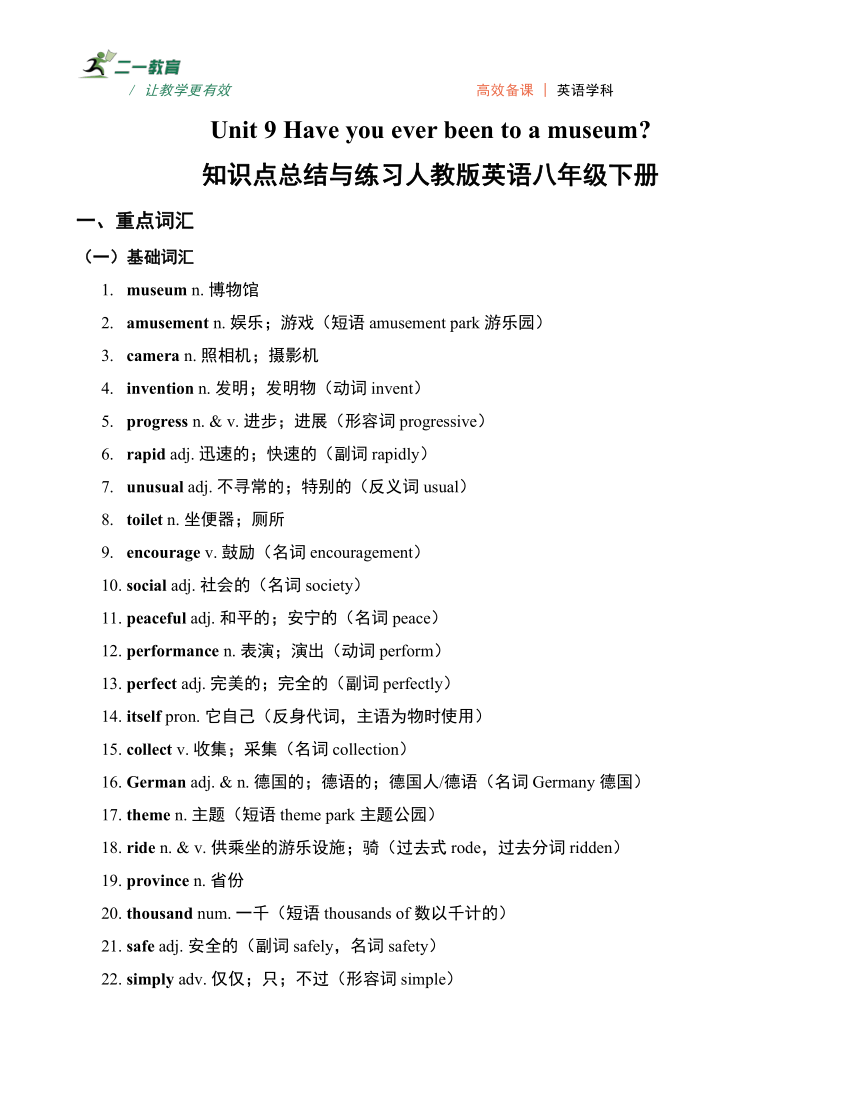
/ 让教学更有效 高效备课 | 英语学科 Unit 9 Have you ever been to a museum 知识点总结与练习人教版英语八年级下册 一、重点词汇 (一)基础词汇 museum n. 博物馆 amusement n. 娱乐;游戏(短语 amusement park 游乐园) camera n. 照相机;摄影机 invention n. 发明;发明物(动词 invent) progress n. & v. 进步;进展(形容词 progressive) rapid adj. 迅速的;快速的(副词 rapidly) unusual adj. 不寻常的;特别的(反义词 usual) toilet n. 坐便器;厕所 encourage v. 鼓励(名词 encouragement) social adj. 社会的(名词 society) peaceful adj. 和平的;安宁的(名词 peace) performance n. 表演;演出(动词 perform) perfect adj. 完美的;完全的(副词 perfectly) itself pron. 它自己(反身代词,主语为物时使用) collect v. 收集;采集(名词 collection) German adj. & n. 德国的;德语的;德国人/德语(名词 Germany 德国) theme n. 主题(短语 theme park 主题公园) ride n. & v. 供乘坐的游乐设施;骑(过去式 rode,过去分词 ridden) province n. 省份 thousand num. 一千(短语 thousands of 数以千计的) safe adj. 安全的(副词 safely,名词 safety) simply adv. 仅仅;只;不过(形容词 simple) fear v. & n. 害怕;惧怕 whether conj. 是否(近义词 if,引导宾语从句) Indian adj. & n. 印度的;印度人(名词 India 印度) Japanese adj. & n. 日本的;日本人/日语(名词 Japan 日本) (二)拓展词汇 invent(动词,发明)→ invention(名词,发明物)→ inventor(名词,发明家) peace(名词,和平)→ peaceful(形容词,和平的)→ peacefully(副词,和平地) collect(动词,收集)→ collection(名词,收藏品)→ collector(名词,收藏家) Germany(名词,德国)→ German(形容词/名词,德国的/德国人/德语) India(名词,印度)→ Indian(形容词/名词,印度的/印度人) 二、短语归纳 have been to 去过某地(已回) amusement park 游乐园 space museum 太空博物馆 science museum 科学博物馆 history museum 历史博物馆 take the subway 乘地铁 put up 搭建;举起;张贴 in the dark 在黑暗中 tea art 茶艺 tea set 茶具 thousands of 数以千计的;许许多多的 on the one hand... on the other hand... 一方面……另一方面…… all year round 全年 far from 远离 close to 靠近;接近 三、词义辨析 (一)have been to / have gone to / have been in 区别 have been to have gone to have been in 含义 去过某地(已返回) 去了某地(未返回) 在某地(持续一段时间) 例句 I have been to Beijing three times.(我去过北京三次。) She has gone to Beijing.(她去北京了。) They have been in Beijing for five years.(他们在北京待了五年。) (二)such as vs. for example such as:列举同类事物中的多个例子,直接跟例子,无逗号(可与 like 互换)。 例:He likes fruits such as apples and bananas.(他喜欢苹果、香蕉等水果。) for example:列举一个例子,用逗号隔开,可位于句首、句中或句尾。 例:For example, he likes apples.(例如,他喜欢苹果。) (三)maybe vs. may be maybe(副词):也许;大概(位于句首)。 例:Maybe he is at home.(也许他在家。) may be(情态动词 + 动词原形):可能是(位于句中)。 例:He may be at home.(他可能在家。) 四、重点句型 —Have you ever been to a science museum 你去过科学博物馆吗? —Yes, I have. / No, I haven’t. 是的,去过。/ 不,没去过。 I’ve never been to a water ... ...
~~ 您好,已阅读到文档的结尾了 ~~